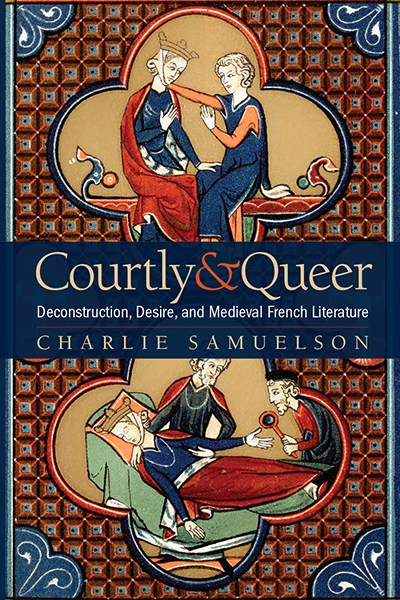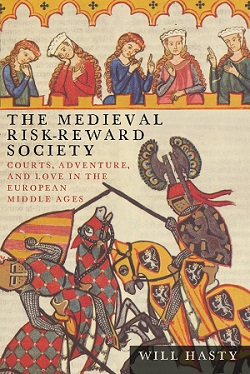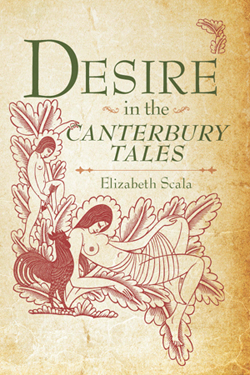“Courtly and Queer moves across a fairly broad range of courtly narratives and Samuelson is an excellent guide. He situates the medieval texts very clearly, giving enough plot summary and context to orient the reader in analyses that are always generously and meticulously articulated....A powerful model for understanding the relationship between the courtly and the queer.” —Peggy McCracken, The Medieval Review
“In Courtly and Queer: Deconstruction, Desire, and Medieval French Literature, Charlie Samuelson situates queerness not in the margins, in lesser known or read texts, but rather at the centre of the canon of French courtly poetry.…through intricate and compelling close readings, he draws out the ‘deviant poetics and sexual politics’ at the heart of courtly literature.” —Moss Pepe, Forum for Modern Language Studies
“Courtly & Queer ultimately demonstrates what queer scholarship still has to gain from a deconstructive approach.…The book’s understanding of queerness is valuable not only for deconstructing the libidinal investments of courtly texts, but also for destabilizing the generic categories and (often teleological) historical narratives into which such texts are inserted. This is smart scholarship that repays careful reading and that gives literary historians, as well as queer medievalists, important food for thought.” —Emma Campbell, H-France Review
“Samuelson does not let his reader relax: he expects the sort of hermeneutical engagement that the greatest of medieval writers asks of their readers. This work is unfettered in its challenge to its readers and to its subjects....This is a monograph to ponder and to masticate, a meditation and a challenge.” —Joseph P. Derosier, Speculum
“The title, though accurate in a comprehensive sense, does not really capture the excitement that this book conveys or the full complexity of its arguments.…Samuelson rubs text against theory so convincingly that their interaction seems natural, essential, almost eerily in sync. The writing is breezy, witty, conversational.…This is a book well worth reading and then reading again.” —Bill Burgwinkle, French Studies
In Courtly and Queer, Charlie Samuelson casts queerness in medieval French texts about courtly love in a new light by bringing together for the first time two exemplary genres: high medieval verse romance, associated with the towering figure of Chrétien de Troyes, and late medieval dits, primarily associated with Guillaume de Machaut. In close readings informed by deconstruction and queer theory, Samuelson argues that the genres’ juxtaposition opens up radical new perspectives on the deviant poetics and gender and sexual politics of both. Contrary to a critical tradition that locates the queer Middle Ages at the margins of these courtly genres, Courtly and Queer emphasizes an unflagging queerness that is inseparable from poetic indeterminacy and that inhabits the core of a literary tradition usually assumed to be conservative and patriarchal. Ultimately, Courtly and Queer contends that one facet of texts commonly referred to as their “courtliness”—namely, their literary sophistication—powerfully overlaps with modern conceptions of queerness.
Charlie Samuelson is an Assistant Professor of French at the University of Colorado–Boulder.
Contents
Acknowledgments
Introduction Verse Romances and Dits, Poetic and Sexual Indeterminacy
Chapter 1 Reflexive, Ambivalent, Queer Subjects
Chapter 2 Medieval Metalepsis: Queering Narrative Poetics
Chapter 3 On Sameness, Difference, and Textualizing Desire: Queering Lyric Insertion
Chapter 4 Queer Irony in Chrétien de Troyes and Guillaume de Machaut
Coda Slashes
Bibliography
Index
“Samuelson is a first-rate medievalist––intellectually rigorous and theoretically sophisticated in ways that enable him to push back against rigid disciplinary constraints and stale orthodoxies. His engagement with verse romance and dits as sites of rhetorical, fictional, and libidinal deviation will inspire scholarly debate for years to come.” —Noah D. Guynn, author of Pure Filth: Ethics, Politics, and Religion in Early French Farce
“Courtly and Queer is masterfully written, ambitious, and provocative. Samuelson’s integration of queer theory into French medieval scholarship bears exciting new implications for questions of authorship, metadiscourse, poetics, and narrative.” —Deborah McGrady, author of The Writer’s Gift or the Patron’s Pleasure? The Literary Economy in Late Medieval France




